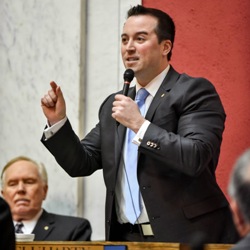West Virginia State Delegate Fluharty Pushing Hard for Online Gambling

The United States officially has four regulated online poker markets, after Pennsylvania recently joined Nevada, Delaware and New Jersey in passing online gambling legislation. The development is seen as an important step in the process of creating a common, sustainable, lucrative online poker market, with the liquidity deal also likely to attract more and more states as momentum builds.
One such state is West Virginia, whose State Delegate Shawn Fluharty is a major proponent of following the example of its southern neighbor Pennsylvania and embracing an online gambling industry. Unfortunately, his legislation isn’t currently receiving much support from other lawmakers, although Fluharty still has high hopes that success in Pennsylvania will help boost support for his bill.
2017 Legislation
In March of 2017, Fluharty introduced bill H.3067, which he put forward with the intention of authorizing interactive gaming, including online poker, sports betting, and daily fantasy sports (DFS). The bill would subsequently set up the Lottery Commission as the industry’s regulator, which would offer online gambling licenses to existing gambling facilities in the state, as well as establish viable gambling and licensing fees for the industry.
Furthermore, it would allow race tracks and licensed gambling facilities to apply for internet gambling licenses at a cost of $50k a piece, with the revenue generated from online gaming then taxed at 14%. Helping to give its nascent online poker market a boost, H.3067 would also allow West Virginia to pool players with those from other regulated states as part of an interstate compact, likely leading it to eventually sharing its players with Pennsylvania, New Jersey, Nevada, and Delaware.
Short Term Outlook
West Virginia has spent the past few years looking at taking its state lottery online and entering the world of online gambling, with the Lottery Commission Director very much open to the idea. However, a combination of the short spring legislative session, and opposition from Republican House Speaker Time Armstead has already ensured that the bill, of which an online lottery product is a part, isn’t going to move forward this year.
Alternative to Raising Taxes
Pennsylvania passing its online gambling expansion bill, which was then signed into law this past week, represented a culmination of the state’s fight to offer online gaming. Naturally, Fluharty had been followed developments closely, and exploring the huge potential an interstate online poker market could have for West Virginia’s finances.
Fluharty also wants to legalize sports betting, and is keeping an eye on New Jersey’s PASPA case that will soon be examined by the US Supreme Court. In fact, he has argued that the money would be essential for the state, as the only other viable alternative would mean raising taxes, which he would prefer avoid doing. Elaborating further, Fluharty said that the state needs to explore new ways to generate revenue and competition, and on a Facebook post stated:
“If we refuse to compete with our bordering states for new revenue, the same playbook will continue to be used. What’s that playbook? Raising taxes. The people are tired of it. #passmybill”
The Best Time to Build Momentum
Fluharty fully appreciates how much success New Jersey has had with its own online gaming industry, and that its market is now likely to grow exponentially following the liquidity agreement signed between itself, Delaware and Nevada. He also understands that When Pennsylvania joins this agreement in 2018, West Virginia is likely to fall even further behind the competition.
In the meantime, several other states are looking to legalize online gambling, too. Legislators in Michigan, for instance, are serious about introducing legalization, as is Illinois, while New York is another state looking to pass a bill next year. The momentum coming from Pennsylvania’s recent online gambling expansion, and the landmark poker sharing agreement is further ensuring that several other states are becoming even more motivated to pursue regulation.
All things considered, an inspired Fluharty should lead to West Virginia becoming one of the states likely to seriously consider passing online gambling laws in 2018, although Fluharty will need to improve his odds of success by first mustering up a greater level of support than is currently being shown in West Virginia.









